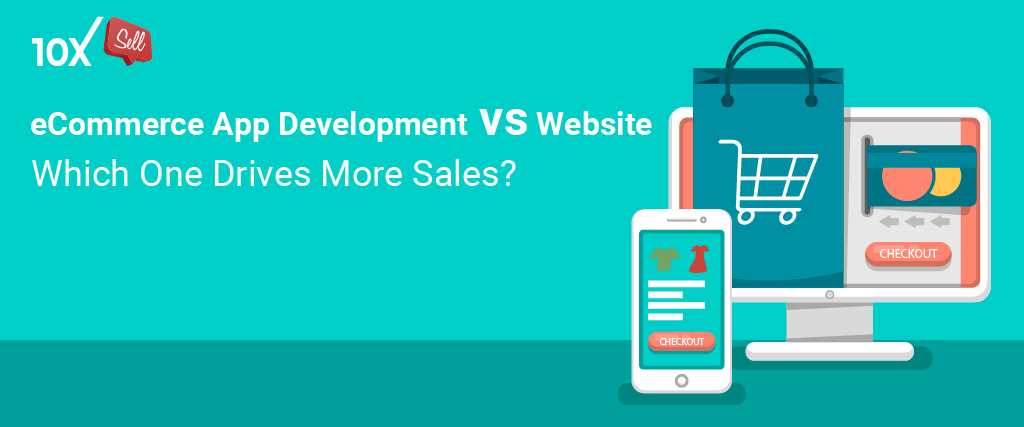eCommerce App Development vs. Website: Which One Drives More Sales?

Given that mobile devices account for 90% of eCommerce traffic, it is obvious that if you want to succeed in this sector, mobile must be your main channel.
Let's face it, though: simply making your website mobile-friendly isn't enough. The experience provided by a native app is simply superior to that of mobile-friendly websites.
Did you realize that compared to mobile websites, eCommerce applications produce three times as many sales? This is due to the fact that apps offer an exceptional user experience and have the ability to entice users to return, even if they do not convert on their initial visit. To learn more in-depth information, keep reading.
E-commerce Mobile App vs. Website: Which One Wins?
Personalized User Experience
Well, the user experience may seem irrelevant but it plays an essential part in customer retention. Unidentified bugs and a poor call to action will have a detrimental effect, and as the eCommerce process involves numerous transactions, this could result in serious issues.
Poor UX will eventually cause visitors to ignore your website or remove your top eCommerce apps, even though they may initially put up with it. Furthermore, nobody wants to lose their cherished clientele.
Let's go right to the point: while eCommerce platforms may offer a respectable user experience, nothing compares to having an application for personalization. That's where you interact with your users around-the-clock.
Unlike websites where users must open the browser, type the URL, and sign in, customers may access exclusive adverts, push notifications, discounts, coupons or scratch cards, expedited order monitoring, improved security, and much more at lightning speed. Better user experience and smooth e-commerce mobile app performance are further benefits of utilizing an efficient e-commerce design.
Shopping Experience
E-commerce apps are popular among mobile shoppers. Not so much for websites on mobile devices. According to research, 90% of the time people spend on their cellphones is spent using apps.
Users of apps are also frequent shoppers, according to research. Compared to about 10 minutes spent on mobile websites, they spend over 200 minutes a month making purchases on their cellphones.
That is a significant disparity. The speed, ease of use, and degree of customization that mobile consumers have become accustomed to from any smartphone experience just cannot be found on mobile websites. Additionally, they lack more sophisticated e-commerce functionality that most app users now take for granted, such as one-tap shopping.
Customer Loyalty
A mobile user has your webstore in their pocket if they have your shopping app installed on their smartphone. Your app icon can be compared to a small, glowing billboard. You're far more likely to be their first pick when they want to buy anything and your app is there, glowing brightly.
You end up with client lock-in. According to research, app users are over twice as likely as mobile website visitors to return for more purchases within 30 days.
B2B E-commerce
It is becoming more and more true that B2B e-commerce is similar to consumer e-commerce. Today's business buyers are typically millennials who prefer mobile devices.
Premium, frictionless experiences with firms like Netflix and Instagram are defining their expectations for online buying. The B2B e-commerce goalposts have been shifted as a result.
Business-to-business (B2B) buyers prefer a buying procedure that is easy to use and tailored to their requirements, including business-level credit and payment choices and simple reorders.
Mobile-First Era
For the first time in 2018, mobile internet usage surpasses desktop traffic, accounting for 52% of all website visitors. It has only continued to develop ever since. It currently outperforms desktop by 60% to 31%.
Globally, mobile purchasing is currently the main factor propelling e-commerce expansion. Mobile commerce will account for 54% of all online sales by the end of this year. Mobile device sales have increased by 33.8% each year since 2016. Revenue from mobile sales will have increased by 22% by the end of 2021, reaching $3.55 trillion.
SEO Advantage
While eCommerce apps provide superior engagement, speed, and personalization, websites have their own set of advantages—particularly when it comes to SEO.
Search Engine Optimization (SEO) is a critical factor for brand visibility. Unlike apps, which do not appear in search engine results unless linked to a webpage, websites allow businesses to rank on Google and attract organic traffic.
Having a website ensures your brand gets discovered by potential customers searching for relevant products or services. Without a web presence, even the best eCommerce app would struggle to acquire new users organically. This is why businesses should consider both a high-quality website and a mobile app to maximize their reach and sales potential
Transform Your E-commerce Business with Yugasa 10Xsell
Companies looking for a high-performing e-commerce app could rely on Yugasa 10Xsell for innovative, AI-powered solutions that boost consumer engagement and sales. By emphasizing scalable and secure design, smooth user experiences, and quick deployment, Yugasa 10Xsell enables businesses to maintain their competitive edge in the online market.
It turns standard e-commerce platforms into powerful sales engines by utilizing cutting-edge personalization and creative technology. Businesses can get in touch with Yugasa 10Xsell to maximize their online business and open up new growth prospects.
Conclusion
Websites are useful, but e-commerce mobile apps provide better interaction, quicker speed, and more customized experiences. Businesses who invest in apps for their mobile-first audience see increased conversions, improved customer loyalty, and a competitive edge. A mobile app is the better option for sustained success.
Also considering the above all points, eCommerce mobile development generates more sales than a website.
